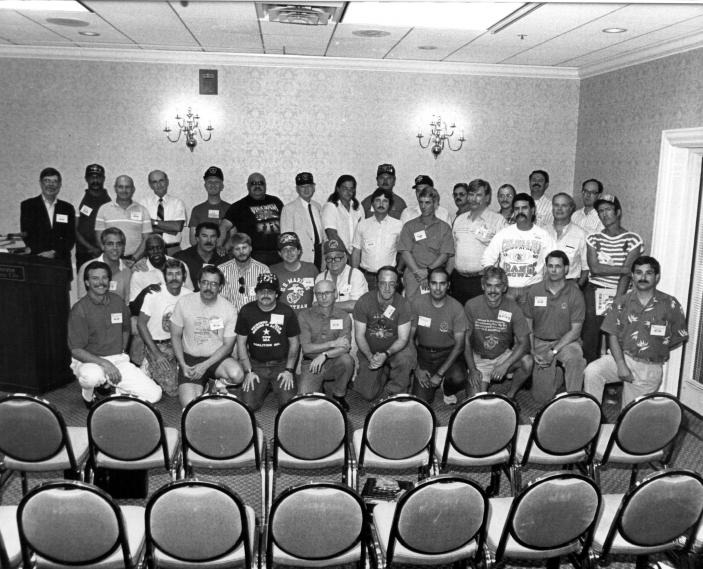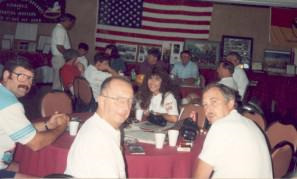"They Still Loved Their Doc"
As years passed from their wartime experiences, veterans gathered together “for friendship, for remembering, [and] for support.” Historian James Wright attributes the start of this period to the 1990s in his book Enduring Vietnam, noting how though “unit reunions are more common…they still are not for everyone.” For many of these Corpsmen, the brotherhood they created with the Marines they served with did not end with the conclusion of their tours in Vietnam, meaning these unit reunions held particular importance. In their personal narratives, Corpsmen demonstrated that although sometimes challenging to attend, these reunions brought closure, helped with personal problems after the war, and strengthened the brotherhood that grew during the hardships of combat.
Former Corpsman Robert Cahill, in his interview with the Sam Johnson Archive at Texas Tech, spoke of the importance of reunions as reinstating his belief in his own history . Because of harsh public response to Vietnam veterans in the years after the war, Cahill found himself questioning his service: “Did I really do that? Did that really happen to me in Vietnam? Did I really get up and run...to that casualty? I was starting to doubt what I remembered.” However, upon starting to attend Delta Company reunions in 2001, Cahill recounted how his men: “still loved their Doc, their Corpsman… they still treated [him] like a King.” Meeting up with his comrades at a reunion helped “legitimize what I [he] did over there, cause I [he] was having his doubts.” For a man who witnessed unfathomable horrors during his service and faced difficulty upon return for a myraid of reasons, reunions represented the “best thing that’s happened…since the War.” The importance of reunions in "Doc" Cahill's narrative demonstrates the longlasting brotherhood of Marines and their Corpsmen, long after the conclusion of the Vietnam War.
Jack Cassidy also spoke on the importance of reunions. While attending his interview Jack brought a plaque that was presented to him by someone he revered, his former Platoon Leader, Lieutenant Olson. This particular year, the former 3/1 Marines scheduled their reunion to honor Corpsmen, something that was unbeknownst to Jack. Speaking on the reception, Jack recounted: “I was the only one that got one, cause it was from my platoon, my guys, which really means a lot to me. And it talked about my courage under fire at An Hoa, and then some of the Marines who later named their sons after me.” This recognition worked in a similar manner to Bob Cahill’s, legitimizing Jack’s own Vietnam narrative and cementing the already strong brotherhood amongst the men who served with Jack.
Reunions have effects beyond legitimizing the history of men as well. In fact, Jack Cassidy defeat alcoholism by attending one: “That’s when I stopped drinking, was at my first reunion.” Through the guidance and friendship of a Sergeant who assured him that Marines didn’t just drink, though initially exhibiting nervousness to attend, Jack attended his first reunion and remarked: “it was great. So I’ve been going ever since.”
In his interview with the Sam Johnson Archive at Texas Tech, Corpsman Slingluff described reunions as a place where he could help other veterans cope with personal battles and Post Traumatic Stress Disorder. Prior to his 3/1 reunion in October of 2004, Slingluff noted how he had “been corresponding with [another Corpsman who] … does have some PTSD.” Slingluff offered that he was “trying to lend him support,” and would attend the reunion to see his old buddy from combat. Slingluff also spoke on how a previous reunion was difficult to attend, due to seeing a certain comrade, Bob Muleson. When Muleson was wounded in Vietnam, he lost both of his legs. Slingluff was convinced he was dead until attending his first reunion, when he saw Muleson again for the first time since the war. Despite that difficulty, Slingluff was “happy” that he went. Slingluff's inclusion of the reunion experience in his narrative demonstrates how important reunions are to his Vietnam experience.
Examining the narratives from former Corpsmen Cassidy, Slingluff, and Cahill demonstrates how reunions continued the brotherhood, and provided relief as well as closure to Corpsmen from the Vietnam War, something of which all of them chose to recount in their own oral histories.

